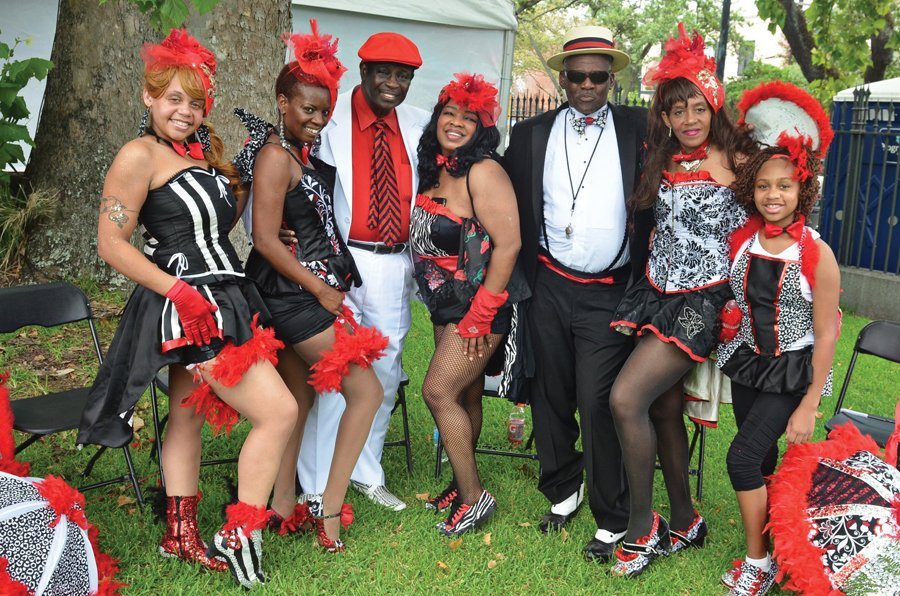When a group of black sex workers had had enough of being segregated, they adopted a special mode of self-expression that has metamorphosed into a radiant baby costume tradition on the streets of New Orleans during Mardi Gras street carnival.
In New Orleans, Louisiana, Mardi Gras day is a colourful sight with adults dressed in full baby costumes with some going as far as sticking the pacifier on their lips. Every day of Mardi Gras, a group of men and women would dress up like babies and celebrate the day. This group of carnival maskers are known as the ‘Baby Dolls’.
The Baby Dolls tradition in New Orleans was started in 1912 by a group of sex workers who felt the need to dress up and hit the streets and celebrate the day in their own style.

The movement arose during the Jim Crow era, a period in American history when there was racial segregation and white supremacy was rife in the South. The term ‘Jim Crow’ was a slang term that was a jeered reference to laws that promoted segregation against black people.
Kim Vaz Deville, author of ‘The Baby Doll: Breaking the Race and Gender Barriers of the New Orleans’s Mardi Gras Traditions’ described how the movement began in the red-light district of New Orleans.
The area, which was already segregated, had legalized prostitution for white sex workers who run their business in Storyville while their black counterparts would go down a few blocks away from where the trade was allowed albeit illegal.

According to the professor, this segregation in the sex industry is a telling of how much black people were deprived in the Jim Crow era.
The movement defied the stereotype of how women were expected to be chaste. It was a bold statement by black women owning their truth. It was expected that women stayed pure but that was not the reality for most black women at the time.
They were engaged in economic activities mostly domestic work which exposed them to sex. Many of them had to engage in the sex work to fend for themselves and their family.
In a society that defined beauty on whiteness, they felt desired and wanted too through sex work. The Baby Dolls redefined the concept of beauty and belongingness by creating this tradition.
The rivalry between the two business blocks led the Black sex workers to invent the baby doll tradition. When the black sex workers heard their counterparts in Storyville were dressing up for Mardi Gras, they also decided to invent a style that would make them relevant on that day.
They decided to call themselves ‘Baby Dolls’ since that was what the men called them. At a time when dolls were uncommon, choosing such a title connoted an ambiguity that rested on the notion that black women were not doll-like, the professor added.
The Baby Dolls was a brazen showcase of self-expression that was unexpected of women in the era, particularly from sex workers, a group that was already considered a misfit.

They would dress up in bloomers, bonnets and stockings and if anyone touched their stockings they would hurt the person as they carried walking sticks for self-defense and for dance.
In an era when women were still perceived as fragile and not expected to be outdoors, it was important that they carried a weapon for defense when they felt unsafe.
There were other aesthetics used by these black women to deride their white counterpart. They wore blonde curls, white face powder and wigs to poke fun at them.
Professor Kim Vaz also added that it was a way of telling men that even though women were dependent, they were still desirable. So beyond aesthetics and derision, it was a statement for the men who desired virgins who could not question their sexual abilities. The Baby Dolls were saying they could be virgins too if the men wanted.
They mimicked certain male behaviours like smoking cigars and throwing money at the men. The idea of throwing money signified independence. This act of displaying wealth has become a central activity among Social Aid and Pleasure groups in New Orleans.
“The early Baby Dolls were very streetwise women who displayed the money they made as a statement of their independence. The idea of making money and showing money is still such a theme among Social Aid and Pleasure groups in New Orleans. There’s a Social Aid and Pleasure Club called the Money Wasters. You hear people calling themselves the Diamond Divas. Having so much money that you can just throw it away means you live the good life. This idea is still something that’s very close to the heart of working-class people. The emphasis is on personhood”, Professor Kim Vaz said in an interview with Pelican Bomb.
It was an avenue for them to have fun. ‘It kept them from crying’, Kim said to NPR. Racial segregation was rife at the time. Black people were discriminated against in a myriad social, economic and political engagements. They were discriminated against in terms of housing, job etc.
Being a woman earned an additional disadvantage of being disenfranchised. It was a lot to take in so the women found a venture where they could also make a statement of independence and have fun while doing so. They even created their own dance, ‘walking raddy’ which permeated other neighbourhoods that adopted the baby doll tradition.

The desegregation laws passed in the 1950s would afford black people in New Orleans an opportunity to do more during Mardi Gras. A bigger slot for participation meant that new activities could be introduced. Gradually, the tradition faded.
But it was resurrected by Miriam Batiste and Antoinette K-Doe. Antoinette revived the tradition at her ‘Mother In-law Lounge’ in New Orleans and Miriam Batiste, who recalled her mother owning the Baby Doll costumes, revived the tradition with her siblings as they dressed and marched for the occasion in the 1970s.
The Baby Doll tradition remains an important part of Mardi Gras in New Orleans.










